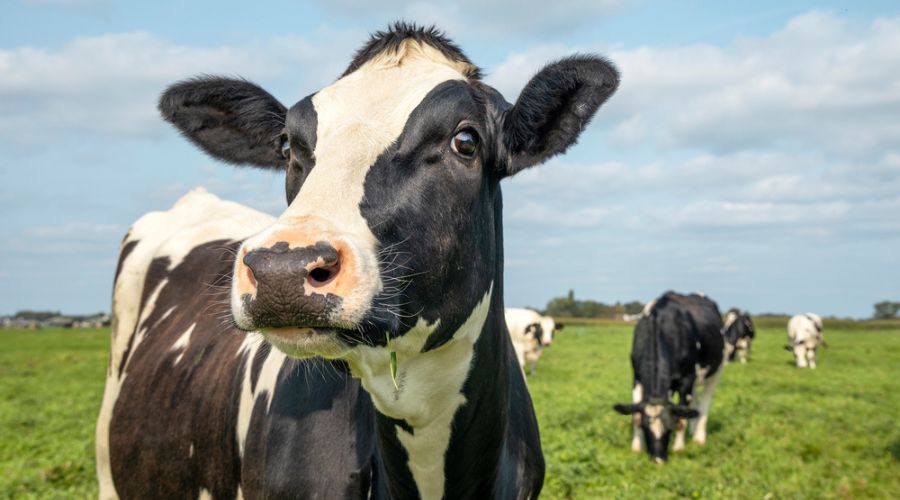TB vaccination to reduce spread in dairy herds by 89%
5th April 2024
The latest research has found that TB vaccination not only cuts down the severity of disease in infected cattle, but also reduces its spread in dairy herds by 89%.

The study, led by the University of Cambridge and Penn State University, improves prospects for the elimination and control of bovine tuberculosis – a disease that results in large economic costs and health impacts globally.
This is the first study to show that BCG-vaccinated cattle infected with TB are substantially less infectious to other cattle. This remarkable indirect effect of the vaccine beyond its direct protective effect has not been measured before.
The spillover of infection from livestock has been estimated to account for about 10% of human tuberculosis cases.
While such zoonotic TB (zTB) infections are most commonly associated with gastro-intestinal infections related to drinking contaminated milk, zTB can also cause chronic lung infections in humans.
Lung disease caused by zTB can be indistinguishable from regular tuberculosis, but is more difficult to treat due to the natural antibiotic resistance in the cattle bacteria.
TB remains endemic in many countries around the world, including in Europe and the Americas, where its control costs farmers and taxpayers hundreds of millions of pounds each year.
Vaccinated animals to be less infectious
Researchers examined the ability of the vaccine, Bacillus Calmette-Guérin (BCG), to directly protect cattle that receive it as well as indirectly protect both vaccinated and unvaccinated cattle by reducing TB transmission.

Vaccinated and unvaccinated animals were put into enclosures with naturally infected animals, in a novel crossover design performed over two years.
Andrew Conlan, associate professor of epidemiology at the University of Cambridge’s department of veterinary medicine and corresponding author of the study, said: “Our study found that BCG vaccination reduces TB transmission in cattle by almost 90%.
“Vaccinated cows also developed significantly fewer visible signs of TB than unvaccinated ones. This suggests that the vaccination not only reduces the progression of the disease, but that if vaccinated animals become infected, they are substantially less infectious to others.”
READ MORE: Farms move one step closer to deployable TB vaccine for cattle
Protecting cattle and humans
The team focused their studies in Ethiopia, a country with the largest cattle herd in Africa and a rapidly growing dairy sector that has a growing burden of bovine tuberculosis.
Abebe Fromsa, associate professor of agriculture and veterinary medicine at Addis Ababa University in Ethiopia and the study’s co-lead author, said: “Bovine tuberculosis is largely uncontrolled in low- and middle-income countries, including Ethiopia.
“Vaccination of cattle has the potential to provide significant benefits in these regions.”

Vivek Kapur, professor of microbiology and infectious diseases, Huck distinguished chair in global health at Penn State and a corresponding author of the study, added: “For over a hundred years, programs to eliminate bovine tuberculosis have relied on intensive testing and slaughtering of infected animals.
“This approach is unimplementable in many parts of the world for economic and social reasons, resulting in considerable animal suffering and economic losses from lost productivity, alongside an increased risk of spillover of infection to humans.
“By vaccinating cattle, we hope to be able to protect both cattle and humans from the consequences of this devastating disease.”
READ MORE: Cattle TB vaccine is closer than ever before as trials enter new phase
Pinned hopes on cattle vaccination

Professor James Wood, Alborada professor of equine and farm animal science in the University of Cambridge’s Department of Veterinary Medicine, noted that despite TB being more prevalent in lower-income countries, the United Kingdom, Ireland and New Zealand also experience considerable economic pressures from the disease which continues to persist despite intensive and costly control programs.
He said: “For over twenty-years the UK government has pinned hopes on cattle vaccination for bovine tuberculosis as a solution to reduce the disease and the consequent costs of the controls.
“These results provide important support for the epidemiological benefit that cattle vaccination could have to reduce rates of transmission to and within herds.”
Find out more about the study here.
Read more livestock news.
